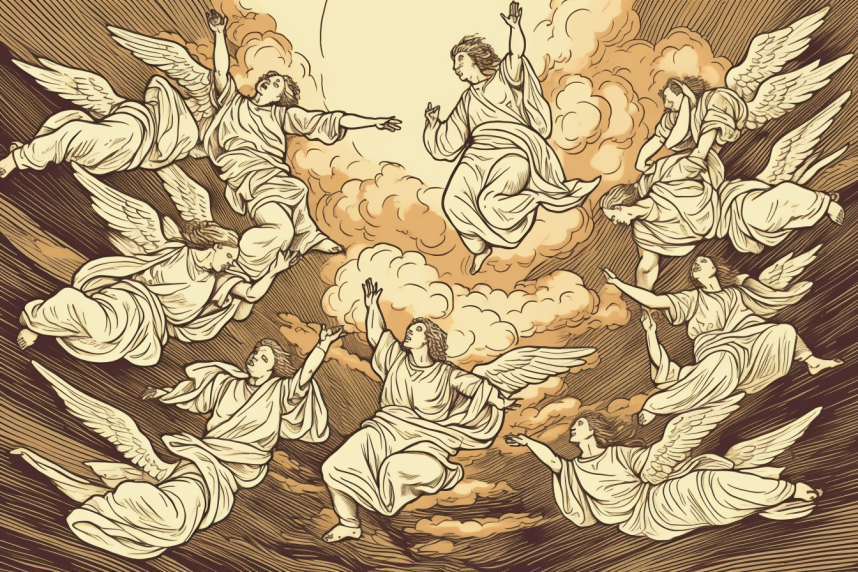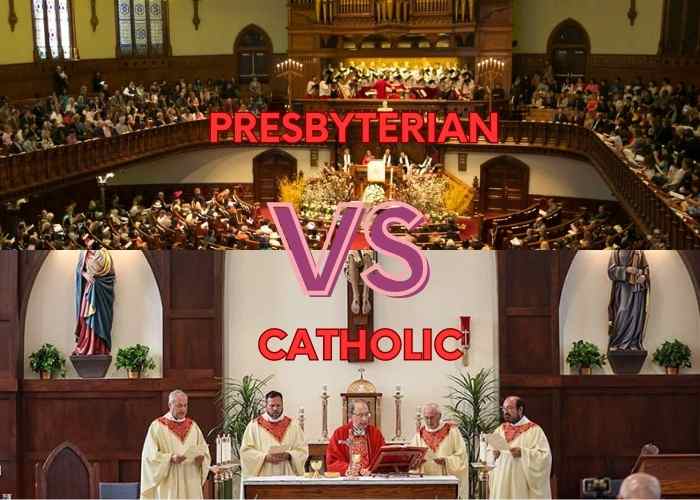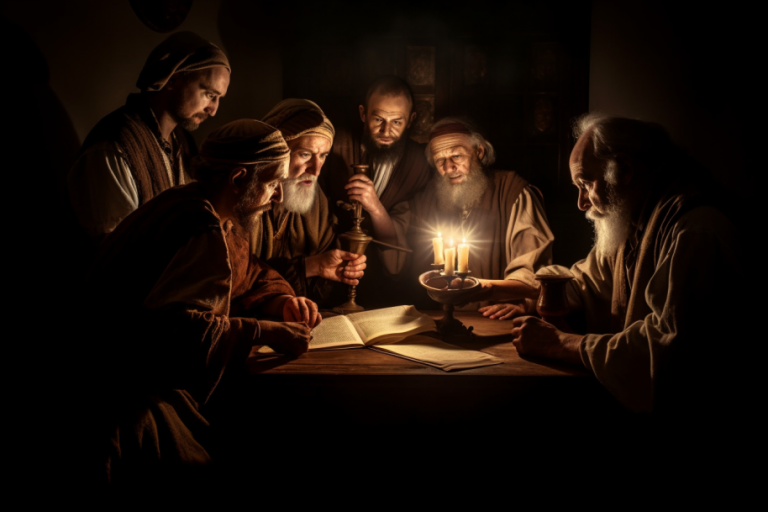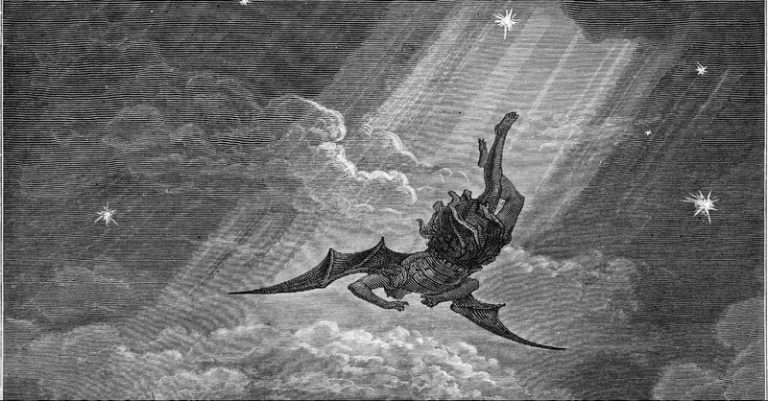Why Stay Away From The Book Of Enoch: Exploring Its Disputed Canonicity and Impact on Christian Beliefs
It’s not uncommon for those interested in biblical studies to come across the Book of Enoch and wonder why it isn’t a part of the accepted canon, especially given its apparent importance in early Christian thought.
This enigmatic work, attributed to the great-grandfather of Noah, has sparked curiosity and debate among scholars and believers alike for centuries.
While some argue that it offers valuable insights into ancient Jewish beliefs and should be taken seriously, others caution against its inclusion as an authoritative text within religious traditions.
This article aims to examine the reasons for this latter position, delving into historical, theological, and scholarly perspectives on why one might want to stay away from the Book of Enoch.
The exclusion of the Book of Enoch from the canon is not merely an arbitrary decision made by religious authorities; rather, it reflects deeper concerns about its authorship, historical context, and theological implications.
By exploring these issues in depth, we will attempt to shed light on why engaging with this text may result in misguided interpretations and beliefs that could potentially undermine one’s faith.
Furthermore, we will discuss how modern scholarship has cast doubt on certain aspects of the book that have traditionally been considered reliable or true. Ultimately, our investigation seeks to provide readers with a nuanced understanding of the complex issues surrounding the Book of Enoch and contribute to ongoing conversations about its place (or lack thereof) within religious studies.

What Is The Book Of Enoch
The Book of Enoch, an ancient Jewish apocalyptic text attributed to Enoch, the great-grandfather of Noah, has been a controversial work among religious scholars and early Christians.
While it was highly regarded by some early Christian writers such as Clement of Alexandria and Tertullian, it was ultimately excluded from the biblical canon due to concerns over its authenticity and the potentially heretical nature of its contents.
These concerns were primarily related to the book’s emphasis on fallen angels intermingling with humans, resulting in ungodly sinners who corrupted ancient society.
Furthermore, certain passages within the text have been interpreted as promoting false teachings that deviate from accepted Christian doctrines.
Despite these apprehensions, the Book of Enoch remained a popular work among various religious communities during late antiquity and into the medieval period.
Its continued influence can be seen in numerous aspects of Christian tradition, such as angelology and eschatology.
However, due to its exclusion from the biblical canon and association with false teachings or ungodly sinners, many theologians and believers have been advised to stay away from this enigmatic text.
As we delve further into understanding the origins of this intriguing work in the next section, it is important to recognize both its historical significance and potential for misinterpretation within a broader religious context.
Origin Of The Book Of Enoch
As the old saying goes, ‘A tree is known by its fruit,’ and this can be applied to evaluating the origin of the Book of Enoch. The origin of the Book of Enoch has been a subject of considerable debate among religious scholars in recent years.
While Enoch is mentioned briefly in the Bible as an ancestor of Noah and a man who ‘walked with God’ (Genesis 5:22-24), there is little information about him beyond these few verses. The Book of Enoch claims to be written by Enoch himself, but evidence suggests that it was likely composed by multiple authors over several centuries during the Second Temple period (approximately 515 BCE – 70 CE).
Although it contains some fascinating stories and apocalyptic visions, many scholars argue that its questionable authorship and inclusion of non-biblical teachings render it unreliable as a source for understanding authentic biblical writings.
The debates surrounding the origin of the Book of Enoch have led to its exclusion from most Christian and Jewish canonical texts.
This exclusion is primarily due to concerns over its theological content, which diverges significantly from orthodox biblical thought.
For example, the Book of Enoch presents a detailed account of fallen angels and their interaction with humanity, attributing much human sinfulness directly to their influence. Such claims are not found in other biblical writings and are considered heretical by some religious authorities.
Despite these concerns, it is crucial to acknowledge that studying the Book of Enoch can offer valuable insights into ancient religious beliefs and practices during the Second Temple period.
As we turn our attention to exploring why this enigmatic text gained popularity throughout history, let us bear in mind both its potential contributions to our understanding of early Jewish thought as well as its limitations as a reliable source for interpreting core biblical themes.
Popularity Of The Book Of Enoch
The Book of Enoch is an ancient Jewish text, believed to have been written in the 2nd century BCE, which has gained increasing popularity among religious scholars in recent years.
It is important to understand the origins of the Book of Enoch and its current level of popularity in order to gain a better understanding of the text.
Origins Of The Book Of Enoch
It’s hard to imagine, isn’t it, that the origins of the Book of Enoch can be traced back to an enigmatic figure mentioned only briefly in the Hebrew Bible?
This ancient Jewish religious work, ascribed to Enoch (Noah’s great-grandfather), has stirred up considerable scholarly debate and analysis.
When investigating the origins of the Book of Enoch, it is important to recognize its complex composition history and diverse themes which have contributed to its popularity over time.
The book itself is a compilation of various texts written between the 3rd century BCE and 1st century CE, reflecting an evolving understanding of cosmology, angelology, and eschatology within early Judaism.
As a result, scholars continue to grapple with questions surrounding authorship, historical context, and reception – all vital aspects in determining the significance of this enigmatic text within religious studies today.
Popularity Of The Book Of Enoch
Given the Book of Enoch’s intricate composition and wide-ranging subject matter, it’s no wonder that its popularity has endured throughout the ages.
In fact, many religious communities – both ancient and modern – have found value in the text, despite some detractors who argue that we should stay away from the Book of Enoch.
The book’s captivating themes, such as cosmology and angelology, have resonated with generations of readers seeking to understand the mysteries of the universe and the divine order.
Furthermore, its apocalyptic vision has made it a touchstone for eschatological speculation within various religious traditions.
As a result, scholars in religious studies continue to be drawn to this enigmatic work, eager to uncover new insights into its origins and enduring appeal.
Who Wrote The Book Of Enoch

The question of who wrote the Book of Enoch is a matter of great debate among scholars of religious studies. The book is thought to have been written between the second century BCE and the first century CE, but its authorship remains uncertain.
The Book of Enoch has traditionally been attributed to Enoch, the seventh-generation descendant of Adam, who is mentioned in Genesis as having ‘walked with God.’ However, many scholars contend that this attribution may be false and that the text was likely composed by multiple authors over an extended period. This assertion arises from various textual inconsistencies and linguistic features found within the different sections of the manuscript.
There are three main reasons offered by scholars who argue that the Book of Enoch was not authored by Enoch himself:
- First, there are apparent linguistic differences within the text which suggest multiple authors. For example:
- The use of Aramaic in some parts while other sections have Greek or Ethiopic influences.
- Varied styles and vocabulary employed throughout the book.
- Discrepancies in chronological order and theological themes.
- Second, some content within the Book of Enoch contradicts certain aspects of biblical accounts, leading scholars to believe it cannot be considered inspired scripture. These contradictions include:
- The portrayal of angels engaging in activities that conflict with traditional angelic attributes found in canonical texts.
- Differences between Enoch’s depiction as a human being in Genesis compared to his elevated status in the Book of Enoch.
- Third, historical context suggests that attributing authorship to Enoch could be a literary device intended to lend authority or credibility to otherwise controversial material. This practice was common during antiquity for texts falsely attributed to well-known figures such as Moses or Solomon.
The uncertainty surrounding its authorship ultimately contributes to reservations about accepting it as inspired scripture or canonical text. As we delve further into Jewish and Christian rejection of the book, we must consider how these factors directly affect the text’s standing within religious traditions.
Jewish And Christian Rejection Of The Book
For centuries, Jewish and Christian communities have rejected the Book of Enoch, but there are differences in the reasons behind their rejection.
In terms of Jewish rejection, there has been a general consensus that the book is apocryphal and not part of the canonical scripture.
On the other hand, Christian rejection of the book has been largely due to its perceived Gnostic themes and inconsistencies with accepted Christian doctrine.
Jewish Rejection
Imagine you’re delving into religious texts, and you come across the Book of Enoch—a fascinating, ancient work with mystical elements.
However, it’s important to note that the Jewish rejection of the Book of Enoch has been a significant factor in its exclusion from canonical scripture. The Jewish community’s reluctance to accept the text stems from concerns surrounding its authorship, as well as its divergence from traditional Jewish beliefs about angels, demons, and other celestial beings.
Furthermore, some scholars argue that the absence of any clear reference to the Book of Enoch in the Hebrew Bible or rabbinic literature suggests that it was never fully embraced by Jewish authorities.
Thus, while it may be an interesting read for those curious about ancient religious perspectives, one must bear in mind that it remains a contested work in both Jewish and Christian traditions.
Christian Rejection
Similarly, the Christian rejection of the Book of Enoch is linked to concerns about its authenticity and theological content.
While some early Christian writers, such as Tertullian and Clement of Alexandria, viewed the work favorably, others dismissed it as apocryphal or heretical due to its controversial portrayal of angels and demons.
Additionally, the absence of direct citations from the Book of Enoch in the New Testament has led many scholars to question whether it was ever widely accepted within Christian communities.
It’s worth noting that certain themes and concepts from the Book of Enoch did influence Christian thought—particularly in relation to eschatology and angelology—but ultimately, it was not deemed worthy of inclusion in the official canon.
Why Was The Book Of Enoch Removed From The Bible
The Book of Enoch is a fascinating and enigmatic text, which has generated considerable debate among scholars and theologians over the centuries. One of the most compelling questions surrounding this ancient work is why it was removed from the Bible. The answer to this question lies in several factors that contributed to its exclusion from the canon of scripture.
The primary reason for the removal of the Book of Enoch from the Bible was that many early Christian leaders rejected the book as not divinely inspired, or even heretical, as they believed it contradicts scripture and contains elements of occult teachings.
This can be observed through a comparative analysis between biblical texts and passages found within the Book of Enoch. The table below highlights some instances where discrepancies arise between these two sources:
| Biblical Text | Book of Enoch | Contradiction/Issue |
|---|---|---|
| Genesis 6:1-4 | Enoch 6-11 | Expanded story on fallen angels and human interaction, potentially contradicting Genesis account |
| Isaiah 14:12-15 | Enoch 14:3 | Different name (Asael instead of Lucifer) and additional details about angelic rebellion |
| Jude 1:14-15 | Enoch 1:9 | Quotation attributed to Enoch, but not found in Old Testament |
| Revelation 20:1-3 | Enoch 10:4-6, 21 | Similar imagery but varying details on judgement day |
Another significant factor contributing to its removal was that many early Church fathers were skeptical about its authenticity, considering it a pseudepigraphical work written under a false name. Additionally, certain sections within the book contain apocalyptic visions and prophecies that may have been deemed too controversial or conflicting with established church doctrine at that time.
Despite these concerns about its authenticity and content, the Book of Enoch remains an important historical document in the study of early Jewish and Christian theology. Its insights offer a unique perspective on various aspects of these religious traditions, and it is worth studying for those interested in understanding their development.
The subsequent section will explore the purpose of the Book of Enoch within its historical context, examining its potential influences on both Judaism and Christianity.
The Purpose Of The Book Of Enoch
Emerging from the murky abyss of theological controversy, we now delve into the core purpose of the Book of Enoch. As a work that holds a unique position outside of canonical books, its influence on early Christian thought is significant despite its exclusion from the Bible.
The primary objective of this ancient text is to reveal divine secrets and esoteric knowledge, providing insights into the heavenly realm and expanding upon biblical narratives, particularly those concerning angels and their interactions with humanity. The Book of Enoch’s content encompasses various themes:

- The Watchers: A group of fallen angels who rebel against God and interact with humans, ultimately leading to divine judgment.
- Enoch’s Heavenly Journeys: Detailed accounts of Enoch ascending through multiple layers of heaven, encountering angelic beings and learning about celestial phenomena.
- Visions and Prophecies: Enoch receives visions of future events, including the coming judgment and establishment of God’s kingdom on earth.
- The Calendar and Astronomy: Explanation of astronomical knowledge within a religious framework, highlighting an advanced understanding for its time.
- Ethical Teachings: Instructions on virtuous living for humanity that align with biblical teachings.
The diverse topics in the Book of Enoch provide valuable insights into ancient Jewish beliefs and contribute to our understanding of early Christian faith development. Its influence can be seen in various religious texts such as the New Testament, apocryphal works like Jubilees and 1 Peter, as well as mystical writings like Merkabah literature.
While not regarded as biblical truth by most denominations today, it remains an essential piece in unraveling the complex tapestry woven by early believers struggling to make sense of their world. Let us shift our focus towards examining how these enigmatic writings find alignment with other sacred scriptures.
Alignment With The Bible
One of the main concerns regarding the alignment between the Bible and the Book of Enoch is that many scholars argue that it does not conform to the traditional canon.
The early church deemed essential for a book to be considered canonical was its agreement with their theological framework and acceptance by a majority of churches.
In this context, the Book of Enoch did not meet these criteria, as its content diverged from what had been established as orthodox doctrine.
The book’s emphasis on fallen angels, elaborate cosmology, and prophecies concerning ungodly sinners led many in the early church to question its authenticity and relevance to Christian faith.
While some might argue that staying away from the Book of Enoch is not necessary because it offers an alternative perspective on biblical narratives, others maintain that engaging with non-canonical texts may lead to confusion or misinterpretation.
As religious scholars, we must consider the historical context in which these decisions were made and strive for impartiality in our engagement with various sources.
Nevertheless, it is crucial for any serious student of religion to understand why certain texts have been excluded from canonical status and how this impacts our understanding of Christianity’s development.
This analysis lays the groundwork for our subsequent exploration into the fear surrounding the Book of Enoch among contemporary believers.
Fear Of The Book Of Enoch
Nevertheless, despite the potential alignment with biblical teachings, there exists a palpable fear of the Book of Enoch in some religious circles. This trepidation may stem from the notion that the text’s content is potentially dangerous or heretical.
As we delve further into this fear, it becomes apparent that the primary concern is not so much about what the Book of Enoch teaches but rather its potential to lead believers astray or promote ungodly behavior.
The Book of Enoch details the fall of angels and their corrupting influence on mankind, resulting in an ungodly committed society. It also expounds on God’s righteous judgment upon these fallen angels and sinful humanity.
While these themes are indeed present in canonical biblical texts, some may argue that delving too deeply into these accounts can foster unhealthy fascination or fear instead of faith and hope.
Consequently, it is essential for individuals who wish to explore this ancient text to approach it with discernment and balance as we now turn our attention to understanding specific reasons one might choose to stay away from the Book of Enoch.
Reasons To Stay Away From The Book Of Enoch
As Pandora’s Box unleashed chaos and suffering upon the world, so too has the Book of Enoch been a source of controversy and confusion among Christians seeking to understand their faith.
It is important to consider the reasons why one should stay away from this enigmatic text, lest it lead them on a path towards misunderstanding or even heresy.
- Not part of the canon of Scripture: The Book of Enoch is not considered part of the biblical canon by most Christian denominations. Although it was well-known in early Christian communities, it was ultimately excluded from the official canon due to its controversial content and uncertain authorship.
- Potential for misinterpretation: The content of the Book of Enoch can be difficult to interpret correctly, especially given its heavy use of symbolism and allegory. This can lead untrained readers into misunderstandings about core Christian beliefs, such as angelic hierarchies, cosmology, and divine judgment.
- Unsound teachings: Some passages in the Book of Enoch contain descriptions that may contradict orthodox Christian teachings. For instance, it describes fallen angels teaching ungodly sinners various arts and sciences – a concept that is not supported by canonical scripture.
- An invitation to speculation: Delving into non-canonical texts like the Book of Enoch can encourage unhealthy speculations about esoteric knowledge or hidden truths not found in scripture. This can distract believers from focusing on essential doctrines and practices within their faith tradition.
In light of these concerns, it becomes evident that engaging with the Book of Enoch without proper guidance or understanding may do more harm than good for those seeking spiritual edification.
It is wise for believers to focus their attention on the established canon of Scripture, which offers a secure foundation for growing in faith and knowledge rather than venturing into uncertain territory where confusion may reign supreme.
Conclusion
In conclusion, one may find the Book of Enoch to be an intriguing piece of literature with its rich history and fascinating accounts. However, as responsible scholars and seekers of truth, we must exercise caution in our pursuit of knowledge.
The reasons mentioned above certainly provide a strong foundation for keeping a healthy distance from the Book of Enoch.
Let us continue to engage with religious texts critically and responsibly, bearing in mind their context, origins, and alignment with recognized sacred scriptures.

Sangtea Hmar is a passionate leader of the Youth Christian Fellowship at the Electric Vengthlang Presbyterian Church in Aizawl, Mizoram, India. He is the owner of Christiantone.com and is committed to spreading the word of God. He loves to mentor youth and help them grow in their faith.






